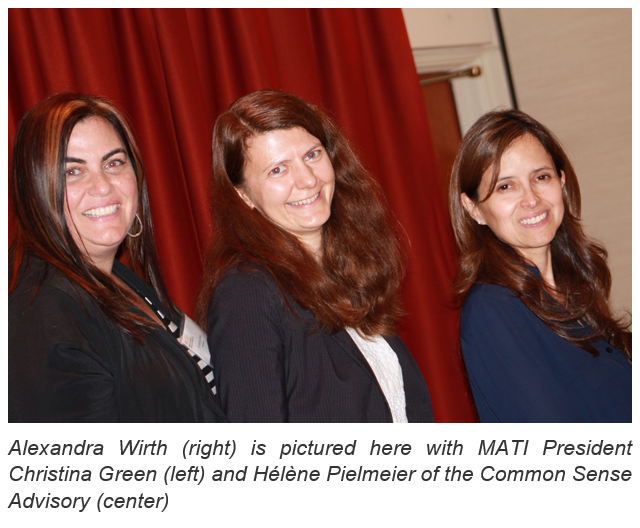Courtroom Dilemmas for the Court Interpreter
Presented by Alexandra Wirth

Among the presentations at MATI’s 11th Annual Conference in Madison, Wisconsin in September was Alexandra Wirth’s presentation, titled “Courtroom Dilemmas for the Court Interpreter.” Wirth’s introduction addressed common misconceptions surrounding court interpreting, as she first defined what court interpreters are NOT: “translators,” advocates, social workers, community liaisons, drivers (gasp!), courthouse tour guides (ugh!), and “the help” (EEK!).
Examples from Wirth’s personal experiences with unprofessional conduct on the part of court personnel toward the interpreter demonstrate the extent to which court interpreters are misunderstood and taken for granted. Wirth, who holds an MA in Applied Linguists and was among the first certified court interpreters in the state of Wisconsin, has encountered such undermining treatment as a judge instructing bilingual members of the jury to evaluate the interpreter’s performance and bilingual attorneys acting as interpreters for their own clients—and often quite unsuccessfully.
Both examples compromise the quality of legal representation and consume valuable time when the interpreter must “re-render” court proceedings for the client. Thus, according to Wirth, those entering the field must have a strong sense of their role within legal proceedings to confront misconceptions and conduct themselves professionally.
For Wirth, court interpreters are, fundamentally, professionals of the language services industry with highly specialized skills that allow them to accurately render the proceedings of a court. They are, moreover, officers of the court who assist individuals with limited English proficiency to understand their legal proceedings. This means that the court interpreter is an essential component of due process, without whom proceedings with parties of limited English proficiency could not take place.
Still, Worth noted that the court interpreter must also understand her limitations. While she strives to remain impartial, she must also foster an awareness of her own limitations as a human. As a professional ensuring the transparency of due process, she must also take the necessary actions to ensure that her limitations do not affect the proceedings of the court.
Limitations that the court interpreter faces include a lack of professional training, lack of familiarity with the subject matter, what Wirth referred to as the “know-it-all syndrome,” physical limitations due to fatigue, and conflicts of interest. She presented many steps that the court interpreter might take to overcome these limitations. Solutions include formal training, improving one’s skills through specialization, carrying out self-study through the development of glossaries, and reading materials in one’s working languages.
Understanding one’s limitations also requires the court interpreter to be candid about her skills, turn down jobs beyond her knowledge base, and work in teams to ensure that fatigue does not hinder due process. Wirth noted that while interpreters may feel inclined to impress by interpreting beyond the recommended 20-30 minute periods of continuous interpretation, that decision will compromise the quality of the court proceedings, resulting in distortion of meaning, more frequent errors and an overall decline in quality that will have a permanent impact on the outcome of a case.
Wirth pointed to team interpreting as an excellent solution for mitigating the physical limitations that all interpreters face, and she provided guidance for how interpreters might operate successfully as a team. This includes establishing ground rules before the start of proceedings to agree on breaks, signals, terminology, handling discrepancies, etc. Wirth also noted that creating an environment of positive team support begins with being there for one’s teammate (i.e. not taking a trip to the vending machine during one’s “break” period). And, as Wirth noted, working collaboratively and interdependently allows for a better overall collective product in which each interpreter can take pride.
Finally, Wirth conveyed concern about where decisions on court interpreters currently originate, as committees to improve interpretation under-represent court interpreters. Wirth noted that it’s all about how the community perceives court interpretation. Her presentation aptly demonstrated that the perception of the court interpreter should begin with the court interpreter, and by conducting themselves professionally, participating in training and working cohesively with legal practitioners and other interpreters as an officer of the court, interpreters will only raise their standing within the field.
Alexandra Wirth is a Federally Certified and Wisconsin Certified Spanish Court Interpreter. She received her Master’s degree in Applied Linguistics from Pontifica Universidad Catolica del Ecuador (PUCE). In addition Ms. Wirth has a B.A. in Mass Communication from the University of Wisconsin-Milwaukee. Ms. Wirth frequently interprets in Juvenile and Adult Court in Milwaukee, Waukesha, and Washington counties. Ms. Wirth also works in Federal court and for several governmental agencies. Ms. Wirth is working on her PhD in Applied Linguistics with a focus on Psycholinguistics research in the area of Second Language Acquisition in Children in the Autism Spectrum.